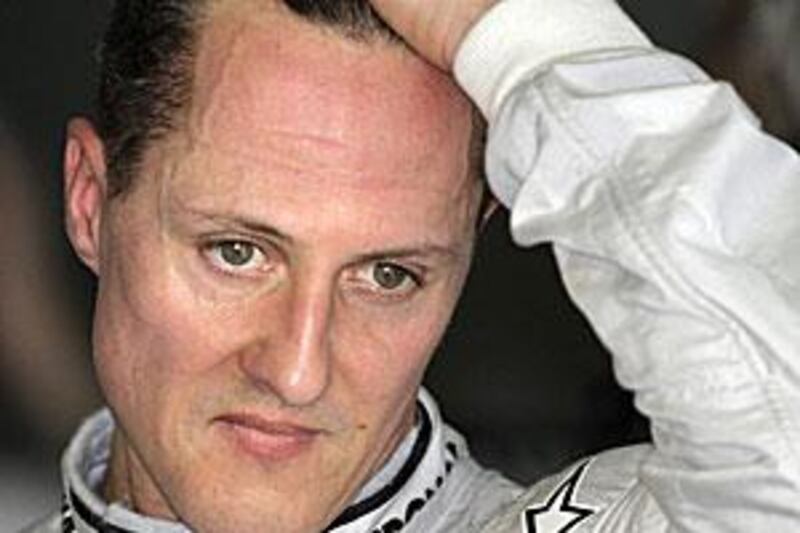The next two Formula One races, in Spain and Monaco, will probably resolve one of the biggest unanswered questions in the sport: was Michael Schumacher wise to attempt a comeback with Mercedes GP? The seven-time world champion is 41 and many are wondering if he has enough left in his tank after three years in retirement.
Since his return to F1 he has been out-qualified and beaten in the first four races by Nico Rosberg, his young German teammate. In Australia in March he struggled to get past Toro Rosso's 20-year-old Spaniard Jaime Alguersuari, who was racing at the Melbourne track for the first time, and ended up 10th. After Schumacher retired in Malaysia and then just scraped a point in China with another 10th-place finish, it left open the question as to whether the winner of 91 races still has what it takes.
"People are going to say he's past it now, which he probably is," said Stirling Moss, the legendary British driver, after the last race in Shanghai. Schumacher will be using a different chassis in Barcelona this weekend and the car's wheelbase has been extended to allow for better weight distribution. The German has probably put in more miles at the Spanish circuit than anywhere else over the years and won there six times, including four in a row from 2001 to 2004, during his golden years with Ferrari.
He has also won five times at Monaco, which follows immediately after Spain. If he fails to shine there against his teammate, with a car tailored to his requirements, the questions will become even more pointed. "After Monaco, we'll know how his form really is," Mark Webber, Red Bull-Renault's Australian driver, told the BBC. "He'll feel a bit more at home at Barcelona and Monaco. They're the sort of places, particularly Monaco, where you just plug Michael in and off he goes. If he's not going to be doing that this year, you can say he might be having problems coming to grips with the car."
Ross Brawn, the Mercedes team principle who was Schumacher's technical director at Ferrari when the German won five titles in a row and most of his 91 race victories, remains convinced the car and tyres are the main problems. "He's trying to find his references and is trying to work out how to approach things," Brawn said in an interview. "Undoubtedly these tyres are a bit different to what he's used to and maybe, with the car and the tyres, it's not towards the way he likes to have a car, which is very responsive and very sharp.
"We haven't been able to provide him with that yet. To remove any doubt, we are going to run a different car in Barcelona, a different chassis. As always in these circumstances you get rid of the variables." "Our step forward in Barcelona will be bigger than you can make at each race during the flyaways [long-haul races] but it would not be realistic to expect us to suddenly be competing right at the front," cautioned Schumacher on his personal website.
"I am hoping for a better race in Barcelona than I had in China and of course I would not mind having had better results so far. "However the good news is that after three years away, I am feeling extremely motivated. So I am clearly ready to take this challenge." By lengthening the wheelbase of the Mercedes, the team should be able to hand Schumacher a car that allows him to show off his talent while also giving Rosberg more flexibility.
The concern, however, remains that in the past Schumacher's great attribute was his ability to drive around problems and make a poor car look good. It could be that Rosberg has excelled in taking the Mercedes to two successive podium finishes, but it could also be that the car is not that bad either. In which case, the problem is Schumacher. * Reuters





